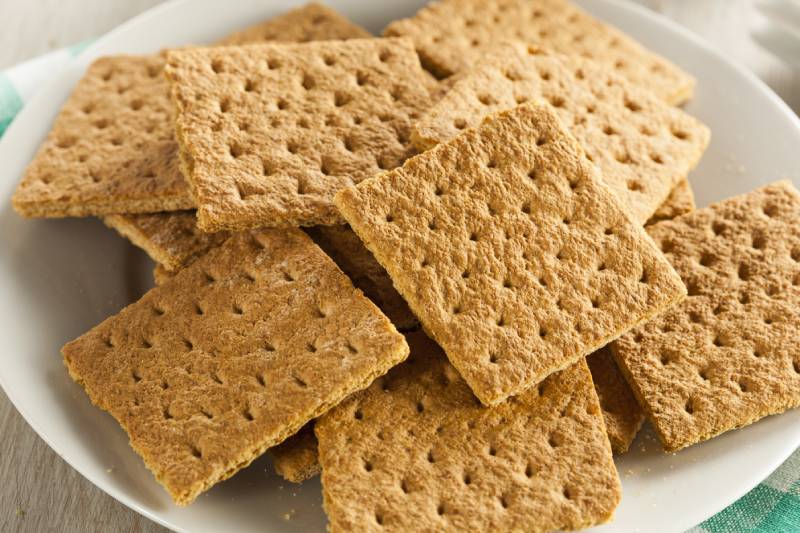Can Dogs Eat Graham Crackers? Nutrition Facts & Safety Guide

Updated on

Graham crackers are beloved treats for camping trips, sleepovers, school lunches, and homemade cheesecakes. With their versatility making them a staple in most households, a curious canine is bound to get their teeth into a packet at some point. Fortunately, graham crackers generally aren’t toxic to dogs, as long as they don’t contain xylitol. However, they do contain ingredients that can be harmful in large doses.
The key is to only ever give your dog a small number of graham crackers without any additions like chocolate or marshmallows. However they don’t contain any nutritional benefits for our pups, and there are better treat alternatives. Read on to understand what can make graham crackers dangerous for dogs.
Can Dogs Eat Flavored Graham Crackers?
Plain graham crackers are safe for dogs in moderation, but you might be wondering whether the same goes for alternative flavors. While the plain variety has its worth if you prefer a simple treat, it’s also nice to treat yourself to your favorite cinnamon or honey flavors.
Extra ingredients often pose a greater risk to dogs. Fortunately, both cinnamon and honey are non-toxic to dogs, provided that they are in small doses.

Cinnamon
A popular addition to cakes and sweet treats is cinnamon. It’s also added to certain graham cracker brands and can add an interesting taste to your camping weekend’s s’mores.
Like many ingredients in human foods, cinnamon is best in moderation for dogs. Large amounts, such as more than 1 teaspoon, can be dangerous. However, the amount that’s in a small piece of graham cracker won’t cause any harm.
Honey
An extra-sweet addition to all sorts of treats is honey. It goes well on toast and in cakes and can even be added to tea. Not only does it have antimicrobial properties, but it also contains antioxidants, vitamins, and minerals.
Honey is safe for dogs to eat too in small amounts.

Are Graham Crackers Safe for Dogs?
Most of the time, the ingredients in graham crackers aren’t dangerous for dogs. You should still use caution when feeding human foods to your dog, though. Honey, cinnamon, and other ingredients in most graham crackers might be safe in moderation, but it’s incredibly easy for a good thing to turn into a bad one.
Sugar Content
Sugar can be bad for dogs but isn’t toxic in small doses—unless it’s combined with something that is toxic to dogs, like chocolate. If they only have a tiny bit of a graham cracker, it’s not likely to cause harm. When sugar is eaten in excess,over time it can lead to weight gain and even obesity.
A lack of sugar can be a problem too. Sugar-free graham crackers and other foods often contain other sweeteners, such as xylitol. While some sugar substitutes are safe for dogs, xylitol is not and should be avoided.

S’mores
Graham crackers are necessary supplies for s’mores, and many come in ready-made packages for super-fast treats. Unfortunately, chocolate can be toxic to dogs and marshmallows are very high in sugar and some can contain xylitol. While your dog can have a small bite of a plain graham cracker, you need to keep them away from any chocolate-covered graham crackers and move the marshmallows out of their reach.
Side Effects of Too Many Graham Crackers for Dogs
Graham crackers might not be toxic to dogs in moderation, but they should never become a big part of your dog’s diet for several reasons.
GI Distress
A sudden change in your dog’s diet can easily upset their digestive system, and sometimes, all that’s needed is the introduction of a new food, especially one higher in sugar. If your dog is sensitive to the ingredients in graham crackers or eats a large number of them when they’re not used to digesting them, they can suffer from stomach upset, vomiting, and diarrhea.

Obesity
Along with causing stomach upsets, the sugar content can lead to another issue. The more excess calories your dog eats, the more weight they’ll put on. You might think that a few extra pounds aren’t that much of a big deal, but an overweight dog is at risk of developing several health issues.
Obesity can strain your dog’s joints, cause heart and breathing issues, and increase their risk of diabetes. If left untreated, your dog’s quality of life and life expectancy can be negatively affected.
What Do I Do If My Dog Ate Graham Crackers?
Graham crackers weren’t made with dogs in mind, but a bite or two won’t hurt them unless they’re incredibly sensitive to the ingredients. If you give your dog a plain, honey, or cinnamon graham cracker and they don’t show any signs of a negative reaction, you can give them another tiny piece on another occasion. Just don’t make it a habit.
Never let graham crackers become a big part of your dog’s diet. They don’t hold any health or nutritional benefits for dogs and should only serve as tasty, one-off treats. When it comes to giving your dog a treat, snacks formulated for dogs are always the safest. If you’re ever unsure about the ingredients in a human food, give your dog a dog-friendly snack instead.
If your dog has a bad reaction to graham crackers, they will likely suffer from a bad stomach ache or vomiting and diarrhea. These issues usually resolve themselves within 24 hours and don’t require veterinary treatment. You should still pay attention to your dog when they eat graham crackers, though.
If your dog’s GI upset doesn’t settle down within 24 hours or they show signs of other, more serious problems, you’ll need to visit a veterinarian. You should also pay close attention to the type of graham cracker that your dog eats. It’s essential to avoid any foods that may contain xylitol.
Conclusion
With their versatility and gentle sweetness, graham crackers are among the best snack foods that you can buy. You can eat them plain, use them as the base of a cheesecake, or even take them camping for campfire s’mores.
While graham crackers aren’t usually toxic or dangerous to dogs, there are better treat options for your pet. If you do choose to share them with your canine, they should only ever have a tiny piece every now and then, and never types that may contain xylitol. Plain, honey, and cinnamon graham crackers are relatively safe for dogs, but they can cause a stomach upset and contribute to weight gain if your dog eats too many.
Featured Image Credit: Monkey Business Images, Shutterstock











